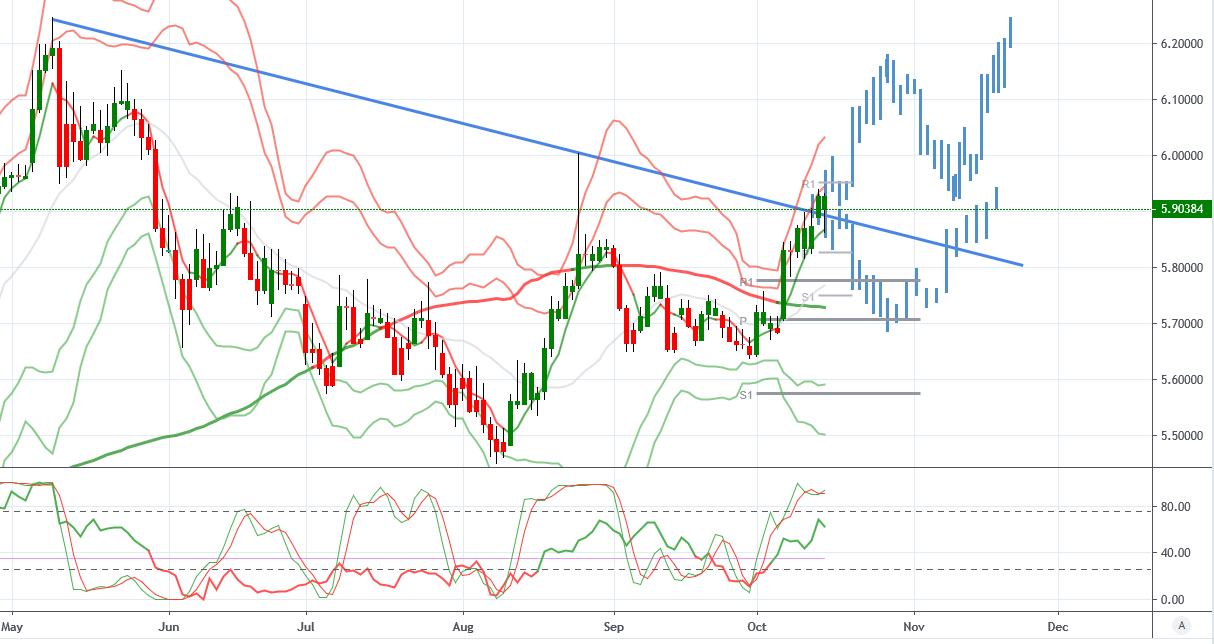Turkish Economy At Risk Over Syria Offensive

Fears of US Sanctions
Alongside concerns for the human cost of Turkey’s invasion of Syria, the operation has also sparked fresh fears over the health of the Turkish economy. The Lira spent much of last year in free fall against the US dollar with inflation spiking to highs of around 25%. Following successive interventions by the Turkish central bank as well as measures by the government, the situation was brought back under control and the economy had started to show signs of recovery.
However, this recovery is now in jeopardy as a result of Turkey's mission in Syria. Along with the cost of launching and maintaining the operation, the offensive has also provoked threats from President Trump who has warned Turkey that if the mission crosses any lines it will face massive sanctions. Writing on Twitter, Trump said: “As I have stated strongly before, and just to reiterate, if Turkey does anything that I, in my great and unmatched wisdom, consider to be off-limits, I will totally destroy and obliterate the Economy of Turkey (I’ve done before!). They must, with Europe and others, watch over...”

In terms of potential sanctions, the US has said that it could apply to target the country’s energy and defence sectors as well as applying sanctions against senior leaders suggest as President Erdogan and any foreign persons who “provide financial, material or technological support”.
The Turkish economy was rattled by US sanctions last year over its refusal to return a US citizen accused of terrorism in the country. US sanctions against Turkey were a major contributing factor to the problems which crippled the Turkish economy for much of last year.
The US shocked the international community last week which it announced its decision to withdraw troops from the Turkish/Syrian border. US troops had been involved in operations there with Turkish troops over the last four years aimed at keeping the peace between Turks and Kurds. The US had backed a faction of Kurdish fighters, the SDF which had been instrumental in helping the US battle the Islamic State in the region. Following news of the withdrawal, the Kurdish community accused the US of abandoning it.
However, the US has been keen to stress that it does not support the Turkish operation though is removing itself from the situation, offering support to neither side. In a statement this week, Pentagon spokesman Jonathan Hoffman said: "the Department of Defense made clear to Turkey - as did the president - that we do not endorse a Turkish operation in Northern Syria".
Challenges For The CBRT
The Lira has been heavily lower against the Dollar since the operation got underway on October 9th. Along with threats from the US, the EU is also reportedly considering sanctions against Turkey. As the country’s main trading partner, restrictions on trade with Turkey could be significantly detrimental to the Turkish economy.
In light of the threat of sanctions against Turkey, investors have been flooding out of Turkish assets and credit default swaps ( a key risk barometer) have surged recently to around 400 basis points creating a sharp jump in the cost of borrowing for the country. With the lira falling and the cost of borrowing ballooning, the Turkish central bank is likely going to need to postpone any planned rate cuts, and might use rate hikes as a means of re-attracting foreign capital.
Technical & Trade Views
USDTRY (Bullish, above 5.7055)
USDTRY From a technical & trade perspective. Price action is strongly bullish here. Price is above the bearish trend line from 2019 highs with longer-term VWAP supporting. Given the volatility, I will be looking to see another break higher then a subsequent retracement which could be used to set longs for a continuation higher. On the other hand, if we fall back from here I will monitor price action into the monthly pivot at 5.7055 for potential long entries.

Please note that this material is provided for informational purposes only and should not be considered as investment advice. The views discussed in the above article are those of our analysts and are not shared by Tickmill. Trading in the financial markets is very risky.
Disclaimer: The material provided is for information purposes only and should not be considered as investment advice. The views, information, or opinions expressed in the text belong solely to the author, and not to the author’s employer, organization, committee or other group or individual or company.
Past performance is not indicative of future results.
High Risk Warning: CFDs are complex instruments and come with a high risk of losing money rapidly due to leverage. 72% and 73% of retail investor accounts lose money when trading CFDs with Tickmill UK Ltd and Tickmill Europe Ltd respectively. You should consider whether you understand how CFDs work and whether you can afford to take the high risk of losing your money.
Futures and Options: Trading futures and options on margin carries a high degree of risk and may result in losses exceeding your initial investment. These products are not suitable for all investors. Ensure you fully understand the risks and take appropriate care to manage your risk.
Patrick has been involved in the financial markets for well over a decade as a self-educated professional trader and money manager. Flitting between the roles of market commentator, analyst and mentor, Patrick has improved the technical skills and psychological stance of literally hundreds of traders – coaching them to become savvy market operators!
